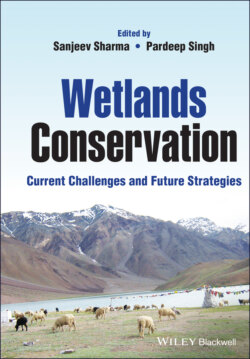Читать книгу Wetlands Conservation - Группа авторов - Страница 19
1.4.2 Conclusion and Recommendation
ОглавлениеWetlands are highly significant for well being of humankind and they safeguard the environment as well uphold the health of the planet earth. Wetlands provide sufficient habitat and breeding grounds for rare and important endangered species and migratory birds, depending on the environment and seasons of the world's various geographical locations. They have a range of hydrological and ecological services, apart from being a source of livelihood, sustenance and other socio‐economic activities. Management and conservation of wetlands systems are directly connected with socio‐ecological security and maintaining the ecological balance. Presently these wetland systems are under significant threat from anthropogenic pressure and climatic changes impacts. Numerous factors are directly or indirectly responsible for wetlands degradation. The majority of wetlands are either disappearing and degrading worldwide due to rapid population growth, unregulated and uncontrolled human activities, land use and land cover change, agricultural expansion, urbanisation, discharge of effluents from the terrestrial environment, global warming and climate change. These are not only environmental or ecological problems, but they have directly affected the livelihoods, culture and sustainability of human well‐being and the maintenance of the natural ecological system. Freshwater biodiversity due to changes in the hydrology are rapidly declining due to intense floods in the floodplains region. Climate change, water shortages, diminishing freshwater supply effects on aquatic flora and fauna has increased the risk of biodiversity loss and climate change. Wetland habitats lead, directly or indirectly to vital measures of the Sustainable Development Goal (SDG). Wetlands conservation are very important to achieving sustainable development targets 2030.
Globally many scholars have done intensive work on wetlands conservation, but presently more attention needs to focus to understand the intergradations of different wetlands composition, structure, biological, physio‐chemical and socio‐cultural as well as economic importance. Wetlands ecosystems are ecologically sensitive and fragile and would be incorporated in the priority area for conservation at national and international level. Presently some of the wetlands at the local and regional level are totally neglected from research and conservation points of view. Only selected wetlands which are internationally or nationally in the list of importance are given priority for conservation and management. More priority needs to be given for the documentation, monitoring, restoration and conservation to reduce the pressure on wetlands. Effective implementation of the wetlands regulation, policy, legislation and strengthening the existing regulation with the participation of all stakeholder needs to be implemented at ground level.
At present, many challenges are existing for wetland conservation and the development of future conservation strategies not only at local level but globally. Some of the challenges are implementation of regulation, legislation, lack of governance, uncontrolled and unregulated anthropogenic pressure, climate change, lack of cooperation from the local community and different stakeholders, public participation and insufficient funding for management of wetlands. The Nutrient cycle affects species composition and richness. Ecological integrity and participation of all stakeholders for protection of wetlands and preservation of wetlands ecosystem would contribute to conserving the extinction of endangered and critically endangered and threatened species of aquatic flora and fauna. People participation for wetlands conservation and strengthening awareness and communication strategies from bottom to top level approach are effective measures for strengthening wetlands conservation participation. Healthy wetlands systems are vital to maintaining the ecological sustainability and socio‐ecological relationship. Community‐level participatory wetlands conservation model based on participatory learning action programme need to develop by using multidisciplinary and interdisciplinary approaches. Management and partition of resource allocation within and in the vicinity of wetlands are required to be given priority in the future. Local communities' pressures on these wetlands for using the ecosystem services can be monitored regularly to reduce pressure and explore new livelihood options and alternative ways of livelihood. Strengthening education, awareness and national and international cooperation may strengthen the new attitude and sound policy. More applied research on wetlands restoration, monitoring and management need to conduct covering different spatial unit. Strict legislation, science based participatory regulation and effective mechanism for wetlands conservation and cooperation among different organisations and institutions. More research funding and opportunities to conduct wetland assessment conservation related study are the major requirements for wetlands conservation and the development of future wetland conservation strategies.
